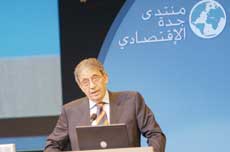JEDDAH, 28 February 2007 — Arab League Secretary-General Amr Moussa said yesterday that impediments such as regional politics and international policies that produce disorder and slow down the economic development of the region had to be addressed in order to ensure sustained growth.
“One wonders about our role. This type of disorder — regional instability and international policies that trigger disorder — will not provide a climate for sustained development,” Moussa, a former Egyptian foreign minister and diplomat, said on the concluding day of the Jeddah Economic Forum 2007.
The theme of the session was “Changing The Global Energy Paradigm,” at which Dr. Majid Al-Moneef, the Kingdom’s governor to OPEC, Amadeo Di Lodovico of the McKinsey Global Institute, Rachad Itani, executive partner of Xenel-Balderrie, and Zeger Degraeve, professor at London Business School, also spoke. Broadcaster Sue MacGregor moderated the session.
“Political stability is a prerequisite for sustained development. But how can it be sustained when the region is threatened by acute and delicate issues in Palestine, Lebanon and Iraq, with sectarian, ethnic and other types of strife?” asked Moussa who gave an overview of the political and energy situation in the Middle East and the Gulf.
Moussa also warned about the delay in the implementation of the recent agreement reached in Makkah between Hamas and Fatah. According to him, the Palestinians need to form the unity government which was agreed to in Makkah as soon as possible in order to get out of the difficulties they find themselves in as a result of the international embargo imposed on the Hamas government.
Indicators show that the Palestinian economy is experiencing difficulties. The per capita GDP has fallen by 33 percent, according to 2005 figures. The number of Palestinians living below the poverty line totals 70 percent of the population in Gaza and the West Bank. Unemployment has increased by 32 percent.
“These are very serious indicators,” Moussa said and asked whether the financial and economic embargo should continue to force this population to submit to Israeli policies.
Moussa said the Iraqi situation had gone from bad to worse. The country’s poverty level is the same as that of the Palestinians. Over 10 million Iraqis are living on the poverty threshold. Unemployment stands at some 50 percent. Casualties are one million and half a million others are wounded and disabled.
“These figures show the acuteness of the crisis experienced by Iraq today. Iraq is threatened by internal strife and religious as well as sectarian and ethnic conflict,” he added.
“We see no other way of coming out of the crisis in the Arab world except if the UN Security Council imposes a political framework that supports the current security policy and guarantees attainment of a consensus among all political parties that will ensure equal citizenship and fair distribution of wealth.
“It should also ensure that Iraq continues to abide by the constitution, that it rejects terrorism and upholds the rule of law. Occupation forces should withdraw. No outside party should interfere with the country’s domestic policy. The country should be helped to re-establish its security institutions,” said Moussa.
The importance of the economic sector in the Arab world should be above the impediments that may hinder Arab joint actions in all spheres of activity, he said, adding that the Arab world is a land of promise in human and natural resources and so great efforts must be made to overcome all of its impediments in order to attain appropriate and positive results.
Reiterating that various Arab states have made quantum leaps in education and many other sectors, Moussa said progress was all the more obvious in Egypt, North Africa and other parts of the Arab world.
Moussa said there was a general tendency to see the movement to reform as fraught with concern.
“We should engage in economic forums, scientific research and dialogue among ourselves so as to achieve democracy and broaden political participation. This should not be overlooked, especially as the region is faced with hazardous political challenges as well as security and stability concerns,” he said.
“Political stability is a necessary prerequisite for sustainable regional economic development. So we should see how we can preserve our achievements and progress, how we can sort out the acute crisis that is triggered by the so-called clash of civilizations and against Islam and Muslims. We already have sectarian, ethnic and other types of strife extending from Palestine to Lebanon, Somalia and Sudan and beyond,” he added.
The nuclear issue concerning Iran is engulfing the region which could have dangerous consequences. “We in the Arab world are concerned with the Iranian nuclear issue which is part of the nuclear issue of the Middle East. It’s not a stand alone issue. This should not be ignored and it must not serve as a source of disruption. We have a position that is based on the need for a peaceful and balanced political settlement. We in this region are not ready in any way to pay the price of a new military adventure in the region regardless of its motivation; we must serve the precise regional interests above all other interests such as a nuclear free zone. Otherwise we will be contributing to the international arms race.”
Even the US administration is required to revive the peace process in the Middle East in keeping with accepted international principles and tenets whereby negotiations should resume to end occupation and establish an independent Palestinian state within a clearly expressed time frame. Moussa was critical of US foreign policy and Washington’s relationship with Israel.
The secretary-general hinted that his organization would furnish details about all possible ways to deal with the Middle East crisis by the end of March, before the Arab Summit in Riyadh. One of the details is related to harmonizing the customs regime by 2015 and establishing an Arab common market by 2020.


